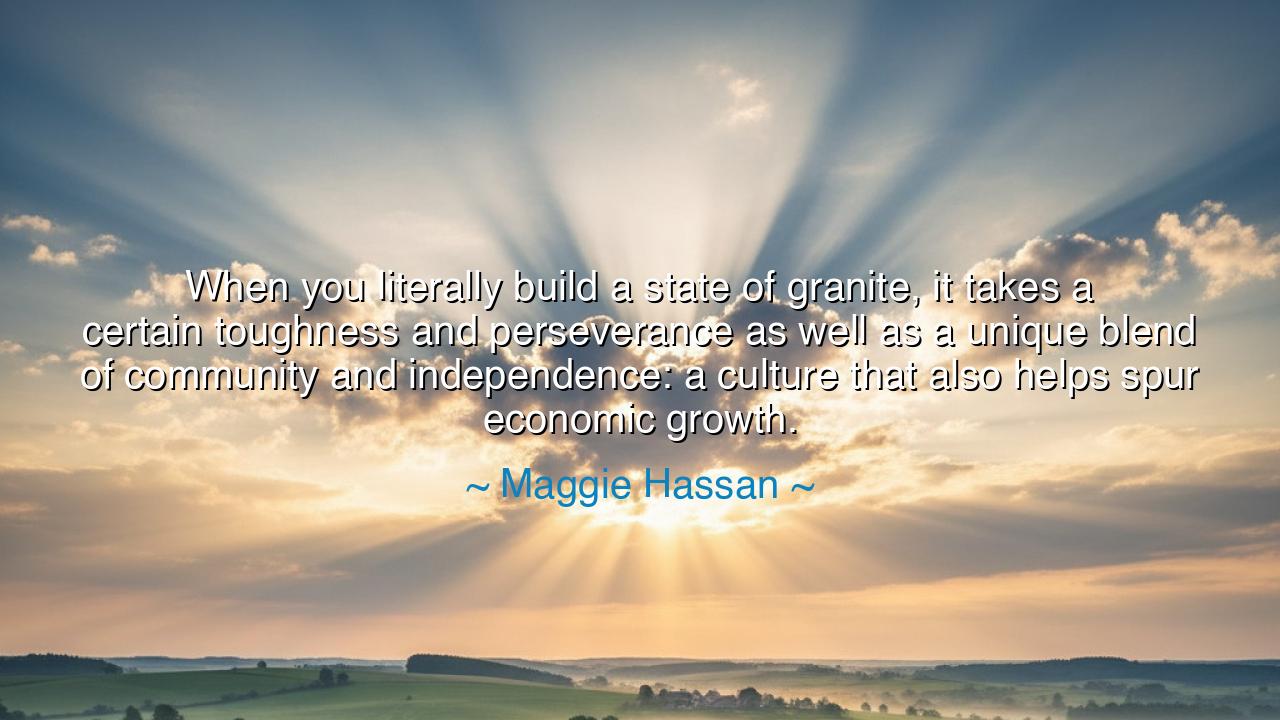
When you literally build a state of granite, it takes a certain
When you literally build a state of granite, it takes a certain toughness and perseverance as well as a unique blend of community and independence: a culture that also helps spur economic growth.






"When you literally build a state of granite, it takes a certain toughness and perseverance as well as a unique blend of community and independence: a culture that also helps spur economic growth." – Maggie Hassan
Hear these words, O seekers of strength and harmony, for they speak of a people carved from stone and spirit alike. When Maggie Hassan, daughter of New Hampshire, spoke of a state of granite, she did not speak only of the rock beneath her land, but of the character of those who live upon it. For granite is not merely a stone — it is a symbol of endurance, of the kind of strength that yields neither to storm nor time. It is a reminder that the foundation of any lasting society must be as firm and unyielding as the earth itself, yet shaped by hands that understand the balance between independence and community.
The meaning of her words reaches far beyond geography. To build “a state of granite” is to forge a culture where resilience and unity are not opposites but partners. Toughness and perseverance are the bedrock of progress — not the loud, brittle strength that shatters under pressure, but the quiet, steadfast power that endures and adapts. Such strength is not born in ease; it is shaped by winters of trial and summers of toil. A society that can rise from hardship without losing compassion, that can work side by side without surrendering individuality — that is a true state of granite.
History, in its vast record of nations, offers us the tale of the American pioneers, who crossed rivers and mountains to carve homes from wilderness. Their journey was not gilded with comfort; it was marked by hunger, loss, and endless labor. Yet from their courage was born a new culture — a people bound together by necessity, yet fiercely proud of their independence. Each family relied upon its own hands, but also upon the outstretched hands of neighbors. That balance — the blend of community and independence — became the secret strength that built towns, industries, and nations. It is this harmony that Hassan invokes: the truth that progress is born not from isolation nor from dependency, but from cooperation among the free.
The granite state she speaks of — New Hampshire — is more than a place; it is a metaphor for a way of life. Its people, living among the mountains and hard soil, have learned that prosperity is not a gift, but a craft. Their culture of self-reliance breeds innovation; their sense of community ensures that no one stands alone. Out of the rugged land, they have built not only strength of body, but strength of purpose — a spirit that turns challenge into opportunity, and labor into growth. Such is the soil from which true economic vitality arises: not greed or ease, but discipline, trust, and the dignity of work.
From her words, we also learn that strength without community is brittle, and community without independence is frail. The toughness of the granite must be balanced with the compassion of those who live upon it. A society that values only self-sufficiency will wither in isolation, but one that values only comfort will lose its edge. The secret is in the blend — in the unity that respects freedom, in the cooperation that honors individuality. Like veins of quartz within stone, these qualities give a nation its beauty and its endurance.
In these words lies a lesson not only for states and nations, but for every soul that walks the earth. To build your own state of granite — your life, your family, your work — you must cultivate both perseverance and connection. Stand firm in your purpose, but open your heart to others. Face adversity not as a curse, but as the sculptor of your strength. Seek the company of those who lift you, yet never forget the power of your own will. For just as granite is formed by fire and pressure, so too is character forged in the trials of life.
Therefore, remember this teaching: to be strong, be as granite — enduring, resolute, and true. But to be great, be as the builder — shaping stone with love, sharing labor with others, and leaving behind a structure that endures. As Maggie Hassan reminds us, the greatness of a people — and of a person — lies not in wealth or power, but in the harmony between independence and community, in the courage to build, and in the wisdom to build together.






AAdministratorAdministrator
Welcome, honored guests. Please leave a comment, we will respond soon